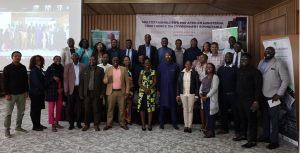As the weeklong 19th African Ministerial Conference on the Environment (AMCEN) commences in Addis Ababa, Ethiopia, on Monday, August 14, 2023, delegates have been called upon to uphold and defend the African position on climate change, which is said to be based on equity, justice, and the right to sustainable development.

The call is the outcome of a roundtable discussion involving some 100 civil society organisations (CSOs) gathered from August 10 to 11 in the Ethiopian capital to address concerns about safeguarding African interests in regional and global environmental and climate change dialogues.
Convened at the instance of the Pan African Climate Justice Alliance (PACJA), the roundtable comprised participants representing environmental, faith-based, indigenous peoples, community-led, women, youth, and farmer organisations. They set out to engage with AMCEN and contribute to its deliberations and outcomes.
While recognising the efforts and achievements of AMCEN in advancing the common African position on climate change and promoting regional cooperation and integration, the CSOs expressed concern over the increasing impacts of climate change on the continent, developed countries’ lack of ambition and commitment to fulfill their historical responsibilities and legal obligations under the United Nations Framework Convention on Climate Change (UNFCCC) and its Paris Agreement, the change in the stance of some African leaders regarding climate justice, and the lack of African CSOs representation in the African Climate Summit.
They, therefore, urged AMCEN to uphold the following priorities for Africa in the decisions and engagement with global and regional stakeholders:
- Securing adequate, flexible, and predictable finance for adaptation, loss and damage and mitigation actions, especially from developed countries with historical responsibility for greenhouse gas
- Aiming to complete and adopt the framework for the global goal on adaptation at COP28; increasing adaptation finance to Africa by more than double and ensuring it is needs-based and accessible to those who need it
- Enhancing access to technology transfer and capacity building to enable African countries to implement low-carbon development strategies and cope with climate
- Promoting equity and justice in the allocation of emission reduction targets and the distribution of climate benefits, considering the principle of common but differentiated responsibilities and respective capabilities.
- Strengthening African voices and representation in the decision-making processes and institutions of the United Nations Framework Convention on Climate Change (UNFCCC) and its subsidiary bodies, especially those of African women, youths, and other marginalised
- Supporting regional cooperation and integration to foster collective action and leverage synergies among African countries on climate
- Promoting low-carbon development paths and green recovery strategies in Africa that focus on renewable energy, energy efficiency, circular economy, and social inclusion.
- Pursuing a just transition attuned to Africa’s reality, upholds the region’s right to development, and protects sectors and workforces likely to be affected by the transition.
They further asked AMCEN to reject any false solutions or conditionality that undermine the continent’s sovereignty, rights and interests, such as carbon market interventions, climate geoengineering, etc.
“We urge AMCEN to reiterate and uphold the principle of common but differentiated responsibilities and capabilities that form the bedrock of Africa’s common position and reject new narratives promoting a principle of shared responsibilities.
“We reaffirm our solidarity and support to AMCEN as an essential voice of Africa in the global climate arena. We commit ourselves to continue working with AMCEN and other stakeholders to advance the African agenda on climate change and ensure a fair, effective, and ambitious outcome of the UNFCCC COP28 in 2023,” added the CSOs.
They also advised AMCEN on issues related to the Kunming-Montreal Global Biodiversity Framework, Plastic Pollution and the International Legally Binding Instrument to End Plastic Pollution, and the sixth session of the United Nations Environment Assembly (UNEA-6).
